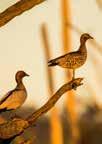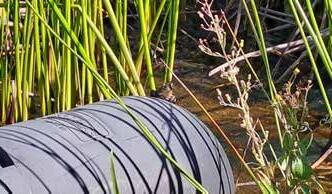LIVERPOOL
In this issue
Taronga Zoo & Chinese Elm

Blue Green Algae
Climate Action Plan
Green & Golden Bell Frog
Annual Workshop
Liverpool Council’s Bush Regeneration Team has been out and about removing the invasive weed Chinese Elm from the banks of the Georges River.
Chinese Elm is highly invasive, as it outcompetes with native trees and shrubs, reduces habitat and food for native animals, invades disturbed bushland and riparian areas, and has potential to invade agricultural land. But there is another upside to this clearing of the weed, as it is used to help feed animals at Taronga Zoo.
Our Georges River Keeper has been removing Blue Green algae which has been discovered at Chipping Norton Lakes around Bulba Gong Island on the northeastern side of the lake.
Blue Green algae is particularly dangerous as it can discolour water, form scums, produce unpleasant odours and tastes and reduce oxygen in the water and kill fish.

Council has recently adopted a Climate Change Policy and Liverpool Climate Action Plan, setting the course to become a net zero emissions organisation by 2036 and community by 2050.
The Climate Change Policy and Climate Action Plan sets clear and realistic goals and actions, identifying emission reduction pathways for Council operations in alignment with National, State, and regional emission reduction targets.
It is important that Council and our community protect our vulnerable species of flora and fauna and that’s why our Council Biodiversity Officer participated in the annual workshop for the creation and management of the endangered Green and Golden Bell Frog (Litoria aurea).
The Green and Golden Bell Frog can be found in the Liverpool LGA.
Ned Mannoun Liverpool City Council
What would you like to see more of in Sustaining Liverpool?
We welcome your ideas - email us erp@liverpool.nsw.gov.au!


HELPING FEED THE Zoo Animals
Liverpool City Council's Banksia Bush Regeneration team supplied Chinese Elms to help Taronga Zoo to feed animals.

Chinese elm [Celtis sinensis Pers.] is an emerging environmental weed naturalised throughout the coastal and riparian (creek-banks, river margins, and streams) regions of eastern Australia.
For more information, visit Weedwise weeds.dpi.nsw.gov.au/Weeds/ChineseCeltis
Harvesting and collection is under a permit with zoo supervision to ensure the plants are best picked for the animals.
L-R: Kevin Crow, Lydia Hall, Ben Zerbes loading the weeds to deliver to the zoo.Blue GreenALGAE
Georges River Keeper sampled the waters at Chipping Norton Lakes in February.
Blue Green Algae was detected in the lake around Bulba Gong Island on the north-eastern side of the lake, the alert for algae has been since downgraded.
To find out more about water quality alerts in your area, phone 1800 999 457 or click here
Please be advised if there are changes, about algae and water quality visit Water NSW here:
• Algae - How WaterNSW manages algal blooms

• Algae - A natural part of the aquatic ecosystem

• Maintaining water quality
What is a blue-green algal bloom?
'Bloom' is the term used to describe an accumulation of algal cells to a point where they discolour the water, form scums, produce unpleasant tastes and odours, affect fish populations, and reduce the water quality. Decomposing algae can also cause depletion of oxygen and induce fish kills.
To learn more about the water quality in Liverpool see Council's Health report card. Visit Council's Environment Volunteering page to join a streamwatch group.
To learn more on how to look after the river and its catchments, visit Georges River Keeper.
COUNCIL ADOPTS CLIMATE CHANGE POLICY AND ACTION PLAN ON PATH TO REDUCE EMISSIONS
Click to view the Liverpool Climate Action Plan

Liverpool City Council has recently adopted a Climate Change Policy and Liverpool Climate Action Plan, setting the course to become a net zero emissions organisation by 2036 and community by 2050.
The Climate Change Policy and Climate Action Plan sets clear and realistic goals and actions, identifying emission reduction pathways for Council operations in alignment with National, State and regional emission reduction targets.
They also outline how Council will support the Liverpool community to reach the NSW target of net zero emissions by 2050.
The Climate Change Policy and Climate Action Plan were placed on public exhibition in June 2022 and were developed in consultation with industry experts, Councillors and internal stakeholders.

The Action Plan includes six key directions:
1. Council as a Leader;
2. Liverpool Collaboration Area;
3. Zero Carbon and Affordable Growth;
4. Climate Resilient Water Supply;
5. New Mobility Future; and
6. Targeted Approach to Waste.
Actions are grouped into these directions to provide clear guidance.
GREEN & GOLDEN bell frogs
Our Council Biodiversity Officer had the opportunity to participate in the annual workshop for the management of the endangered Green and Golden Bell Frog (Litoria aurea) a frog that is found in the Liverpool LGA. This event was hosted by Sydney Olympic Park Authority (SOPA) which is part of the NSW Government Saving our Species program. The day had a wide range of presentations and end of day private walk-around the SOPA grounds.
Leading subject matter specialists conducted educational and exciting presentations which included the following;
• The ecology of the Green and Golden Bell Frog

• Designing and maintaining habitat



• The influence of Gambusia holbrooki (mosquito fish) on site selection
• Improving translocation outcomes using sound analysis software to complement acoustic monitors for detecting the Green and Golden Bell Frog.
Following the presentations, a private end of day field trip was conducted by the SOPA team. The team showed participants around the grounds where they got to explore some of the Green and Golden Bell Frog habitats they have on the grounds as well as unique parcels of woodland, bird habitat and other park amenities. During the exploration across the grounds, the group were fortunate enough to sight two Green and Golden Bell Frogs basking in the sun within one of the wetlands.
The Green & Golden Bell Frog can be found in a protected site, an old shale quarry, see where to explore here.
SUSTAINABILITY WORKSHOP UPDATE

Liverpool residents learned about the what, the where and how of wild food with food forager Diego Bonetto.
This included:
• wild plants as food
• use of wild plants in folk medicine
• edible and medicinal possibilities in your garden
• botanicals in cordials and vermouths
• wild plants for soap-making, salves or ointments.
Each participant received a wild edible booklet to find out more about Diego’s work & tours, visit here.
Ultimate olive recipe ROASTED
OLIVES
Special guests, Birdlife Southern NSW Judy Harrington, and artist Lisa Woolfe.
Serious about birds? Our residents got to go birding with Judy Harrington along the Tucoerah (Georges) River near Casula Powerhouse Arts Centre.
In the drawing workshop with Lisa Woolfe, participants enjoyed learning about the migratory birds that stop along the Tucoerah River estuary on their journey along the East Asian-Australasian flyway. Participants learned to draw a range of birds including moorhens, herons, pelicans, cuckoos and more!

If you love olives, here is a great recipe for entertaining in the cooler months at home:
1. Take drained olives, add lemon or orange slices, garlic cloves, rosemary, and a drizzle of olive oil.
2. Bake for about 30 minutes at medium heat until they look roasted and a bit shrivelled.
3. Enjoy with your family and friends as an afternoon snack or as a side dish with lunch or dinner
So delicious, why not see if there is room for an olive tree in your backyard? Contact your local plant nursery for advice.

Also, be sure to be across the relevant food allergy and food safety information for your family & friends.
Credit Reference milkwood.net
A global movement that helps millions of people be part of the solution to plastic pollution – so we can have cleaner streets, oceans and beautiful communities. Visit the website to discover solutions and ideas, join the challenge and refuse single use plastic.

In-person and online events, virtual tours, DIY science and more, all across Australia, from 12-20 August. Visit the Science Week website for details.
Liverpool City Council is thrilled to be part of National Tree Day.
Established in 1996 by Planet Ark, National Tree Day has grown into Australia's largest community tree-planting event. The initiative encourages everyone to volunteer their time, get their hands dirty and get involved in tree-planting community events, greening our city along the way.

By planting more trees, we will create a greener, cooler and more liveable future.
Council’s planting day will take place on the 29 July 2023 in partnership with Greater Sydney Landcare, click here for details.
The Sustainable Environment Grant
The sustainable environment grant program helps reduce schools & community groups to reduce their impact on the environment and implement environmentally sustainable actions.
Are you ready to play?
Amuse, engage and educate your little ones about nature. Children haven’t forgotten the power of nature; they merely haven’t had access to it. This workshop helps children tune into their surroundings, connect & play. Learn how to deepen you children’s relationship with nature & themselves in a small group setting.
• 27 September 10-11:30am
• For ages 5-9 years old, (under 3 siblings are free)
For enquiries and to book, email erp@liverpool.nsw.gov.au with name, mobile and number of participants.
Key funding priorities fall under the categories of natural environment, sustainable gardening, sustainable water use & waste minimisation or recycling.
Up to $5000 in grants is available. Applicants who demonstrate a commitment to the project through either financial or volunteer support were considered favourably. Click here for more information
